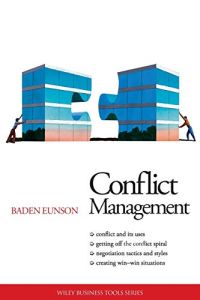Acesse a sua conta getAbstract para obter o resumo!

Acesse a sua conta getAbstract para obter o resumo!
Baden Eunson
Conflict Management
Wiley, 2007
Sobre o que é?
Conflict can be negative or positive. It’s part of life, and also what you make of it.
Recommendation
Wanna fight? This book says you should and shows you how you can benefit from conflict. Author Baden Eunson clearly defines his topic and breaks it down into easily digestible components. He analyzes conflicts from various perspectives to show how they can evolve and build up strength. He explains how the involved parties can either gain from or succumb to the powers unleashed by conflict. getAbstract recommends this highly understandable, practical guide to those who need help navigating through the minefield of conflict. And if you'd rather avoid a fight and work out your differences in a more controlled atmosphere, Eunson dedicates a good portion of the book to the negotiating process, so you can decide whether you prefer bare-knuckles warfare or a more civilized alternative.
Summary
About the Author
Baden Eunson teaches in the school of English, Communications and Performance Studies at Monash University in Melbourne, Australia. He also runs a training and consultancy business. He is the author of numerous books, including C21: Communicating in the 21st Century.
















Comment on this summary